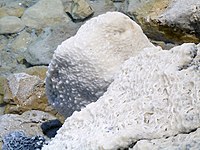
Photo from wikipedia
PurposeSalt intake among children in Switzerland is unknown. The objectives of this study were to determine salt excretion and to identify the main dietary sources of salt intake among children… Click to show full abstract
PurposeSalt intake among children in Switzerland is unknown. The objectives of this study were to determine salt excretion and to identify the main dietary sources of salt intake among children in one region of Switzerland.MethodsWe conducted a cross-sectional study using a convenient sample of children 6–16 years of age in Valais, Switzerland, between 2016 and 2018. All children visiting several regional health care providers and without any clinical condition that could affect sodium intake or excretion were eligible. Each child completed a 24-h urine collection to assess salt excretion and two dietary questionnaires to assess dietary sources of salt intake. Weight and height were measured.ResultsData were available on 94 children (55 boys and 39 girls; mean age 10.5 years; age range 6–16 years). The mean 24-h salt urinary excretion was 5.9 g [SD 2.8; range 0.8–16.0; 95% confidence interval (CI) 5.3–6.5]. Two-thirds (62%) of the children had salt excretions above recommendations of maximum intake (i.e., ≥ 2 g per day for children up to 6 years of age and ≥ 5 g per day for children 7–16 years of age). The salt excretion tended to be higher during the week-end (6.0 g, 95% CI 5.4–6.6) than during the week (5.4 g, 95% CI 4.3–6.7). The main sources of salt intake were pastas, potatoes, and rice (23% of total salt intake), pastries (16%), bread (16%), and cured meats (10%). One child out of three (34%) added salt to their plate at the table.ConclusionsSalt intake in children in one region of Switzerland was high. Our findings suggest that salt intake in children could be reduced by lowering salt content in commonly eaten foods.Trial registration numberNCT02900261.
Journal Title: European Journal of Nutrition
Year Published: 2018
Link to full text (if available)
Share on Social Media: Sign Up to like & get
recommendations!